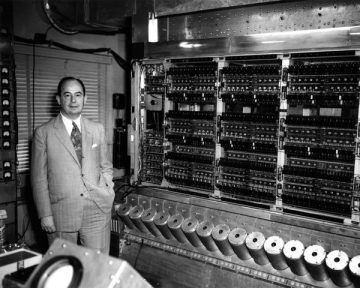Ashutosh Jogalekar in The Curious Wavefunction:
 That John von Neumann was one of the supreme intellects humanity has produced should be a statement beyond dispute. Both the lightning fast speed of his mind and the astonishing range of fields he made seminal contributions to made him a legend in his own lifetime. When he died in 1957 at the young age of 56 it was a huge loss; the loss of a great mathematician, a great polymath and to many, a great patriotic American who had done much to improve his country’s advantage in cutting-edge weaponry.
That John von Neumann was one of the supreme intellects humanity has produced should be a statement beyond dispute. Both the lightning fast speed of his mind and the astonishing range of fields he made seminal contributions to made him a legend in his own lifetime. When he died in 1957 at the young age of 56 it was a huge loss; the loss of a great mathematician, a great polymath and to many, a great patriotic American who had done much to improve his country’s advantage in cutting-edge weaponry.
Starting with pure mathematics – set and measure theory, rings of operators, foundations of mathematics in the 1920s and early 30s – von Neumann moved to other mathematical topics like ergodic theory, Hilbert spaces and the foundations of quantum mechanics that were closer to physics. He then moved into economics, writing “The Theory of Games and Economic Behavior” with Oskar Morgenstern which laid the foundations of game theory (a first edition in good condition now sells for $12,500). Von Neumann contributed to many other fields in major and minor ways. During and after the war he turned his powerful mind to defense-related research. He played a key role in developing the idea of implosion used in the plutonium bomb during the Manhattan Project and made valuable contributions to consulting on ballistics and shock waves. After the war von Neumann turned completely to applied mathematics. Perhaps the major reason for this transformation was his introduction to computing during a consulting stint in England during the war in 1943. Even as nuclear weapons promised to completely change politics, science and international relations, he was writing in a letter to a friend at the end of the war, “I am thinking about something much more important than bombs; I am thinking about computers.”
More here.
